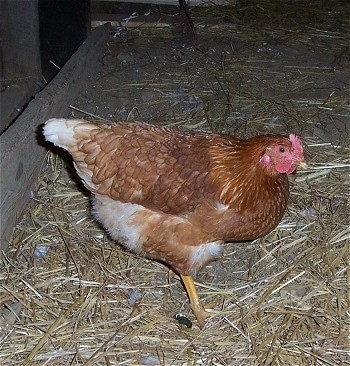
ISA Brown = Rhode Island Red / Rhode Island White mix hen
Female chickens are called hens.
Male chickens are called roosters.
Hens lay eggs, roosters do not. When a hen lays an egg it will only hatch into a chick if a rooster has fertilized the egg by mating with the hen. The hen and the rooster must mate before the egg is laid in order for the egg to be fertilized. If a rooster does not mate with the hen the egg will not be fertilized. Hens will lay eggs even if a rooster is not present. Most eggs you buy in the store are not fertilized because there was no rooster present.
A hen and a rooster do not have to mate daily for all eggs to be fertilized. If a rooster is removed from the presence of a hen the eggs may still be fertilized for about a week or so.
A free-range chicken is a chicken that is not caged and has a yard in which to run around. Eggs laid by free-range hens are lower in cholesterol than commercial chickens that are caged in small cages. The cages are too small for the chickens to get the proper exercise.
Hens actually make great pets, so long as the zoning laws in your area allow you to keep chickens.
Chickens can be trained to come to you by picking a call, and offering them a treat when they come. For example, if I go out to our chickens and yell, "Chiccckkkennnns!!!!" they all come running for the white millet treat I have for them. Some of the more socialized chickens will even eat out of your hand.
Chickens love to eat white millet as a treat.
If a hen does not get enough calcium in her diet, the eggs she lays will have soft shells. Most feed their chickens a diet high in oyster shell so they obtain a high amount of calcium.
Believe it or not, chickens love to eat their own eggs. They will not eat an egg that is not already cracked, but toss an egg onto the ground and watch them come running to eat the white and yolk. They just love it!
NOTE: Some have claimed this may cause egg pecking, where the chicken pecks their eggs on their own. Could be, however I have been tossing my free-range chickens eggs for 10 years and never had an egg-pecking problem. I tend to think that the issue of egg pecking is more caused by over-crowded conditions along with the hens not getting their bird instincts met. It's not natural for a bird to break its own eggs. My free-range chickens rather try to protect their eggs, clucking at me when I reach under them to gather them up.
If you ever run into an egg-pecking issue, here is a suggestion to try and stop the behavior. Get plastic Easter eggs. Fill them with plain yellow mustard and place them in the nests. The chickens will peck them open and be disgusted by the mustard. Give them several such eggs every day until the egg pecking stops. If the chances of getting a mustard-filled egg outweigh the chances of getting an actual egg, they will soon stop pecking, and you will have eggs to collect again.
Frizzled Bantam chickens are rare Bantams with curly feathers. If two frizzles mate and four eggs are laid, often only one chick will be frizzled.
Roosters make a Cock-a-doodle-doo sound (clip of a Banty rooster surrounded by Rhode Island Red, Barred Rock (Black) and New Hampshire Red hens).
The study of eggs is called oology.
Chicken eggs hatch after about 21 days of incubation
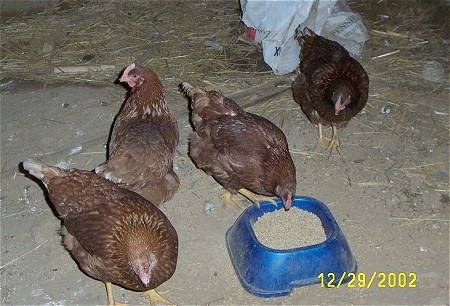
ISA Browns = Rhode Island Red / Rhode Island White mix hens
"These are my two chickens named Turkey and Goose. My cat Cloey was fascinated by them when they were baby chicks. Now they are full grown and she is scared to death of them. They just laid their first set of eggs today, so I am a proud chicken-momma."
Cloey the cat smelling a baby chick
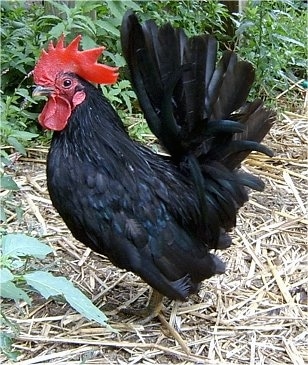
Frank, a Banty rooster
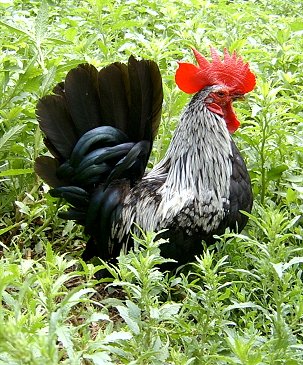
Elvis, a Banty rooster
Rhode Island Red hens with Banty roosters
Elvis and Frank, Banty roosters—As they got older they started to fight with one another and had to be separated.
Rhode Island hen laying an egg
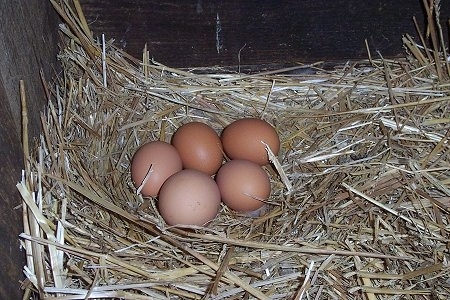
Rhode Island Red hens lay brown eggs
Roy the rooster
Chicken Quick Fact